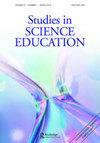了解成功的STEM俱乐部的条件:证据基础告诉我们什么?
IF 9.9
2区 教育学
Q1 EDUCATION & EDUCATIONAL RESEARCH
引用次数: 0
摘要
摘要STEM(科学、技术、工程、数学)俱乐部作为吸引学生参与STEM相关活动的一种手段,势头越来越大。尽管有这种增长,但研究这些非正规教育空间中的实践条件的尝试有限。本文通过对实证和从业者出版物的全面文献综述来解决这一差距,重点是综合支持STEM俱乐部成为有效学习环境的方法。本综述共收录33篇论文。通过严格的文献审查过程,研究小组确定了一些关键的重点领域,这些领域有助于实现学习成果和方案的可持续性。这些重点领域分为三个关键主题——俱乐部管理、环境和项目评估——STEM俱乐部从业者应关注这些主题,以确保采用消息灵通的方法。在每个主题中,都确定了一些子维度,这些子维度提供了实践见解和实例,说明如何在STEM俱乐部中以与质量相关的方式制定这些条件。本文提出的循证研究结果可供从业者用于指导STEM俱乐部实践。此外,本文还确定了在非正规教育环境中探索当代实践需要研究的地方。本文章由计算机程序翻译,如有差异,请以英文原文为准。
Understanding the conditions informing successful STEM clubs: What does the evidence base tell us?
ABSTRACT STEM (Science, Technology, Engineering, Mathematics) clubs are gaining momentum as a means for engaging students in STEM-related activities. Despite this growth, there have been limited attempts to examine the conditions that inform practice in these informal educational spaces. This paper addresses that gap through a comprehensive literature review of empirical and practitioner publications, with a focus on synthesising the approaches that support STEM clubs to be effective learning environments. In total, 33 papers were included in this review. Through a rigorous literature review process, the research team identified a number of key focus areas that support the achievement of learning outcomes and programme sustainability. These focus areas are grouped into three key themes – club management, environment, and program evaluation – that STEM club practitioners should attend to in order to ensure a well-informed approach. Within in each theme a number of sub-dimensions were identified, which provide practical insights and lived examples of how these conditions can be enacted within STEM clubs in ways that speak to quality. The evidence-based findings presented in this paper can be used by practitioners to guide STEM club practice. Further, the paper identifies where research is required to explore contemporary practice in informal education settings.
求助全文
通过发布文献求助,成功后即可免费获取论文全文。
去求助
来源期刊

Studies in Science Education
EDUCATION, SCIENTIFIC DISCIPLINES-
CiteScore
15.30
自引率
2.00%
发文量
7
审稿时长
>12 weeks
期刊介绍:
The central aim of Studies in Science Education is to publish review articles of the highest quality which provide analytical syntheses of research into key topics and issues in science education. In addressing this aim, the Editor and Editorial Advisory Board, are guided by a commitment to:
maintaining and developing the highest standards of scholarship associated with the journal;
publishing articles from as wide a range of authors as possible, in relation both to professional background and country of origin;
publishing articles which serve both to consolidate and reflect upon existing fields of study and to promote new areas for research activity.
Studies in Science Education will be of interest to all those involved in science education including: science education researchers, doctoral and masters students; science teachers at elementary, high school and university levels; science education policy makers; science education curriculum developers and text book writers.
Articles featured in Studies in Science Education have been made available either following invitation from the Editor or through potential contributors offering pieces. Given the substantial nature of the review articles, the Editor is willing to give informal feedback on the suitability of proposals though all contributions, whether invited or not, are subject to full peer review. A limited number of books of special interest and concern to those involved in science education are normally reviewed in each volume.
 求助内容:
求助内容: 应助结果提醒方式:
应助结果提醒方式:


